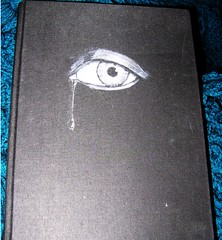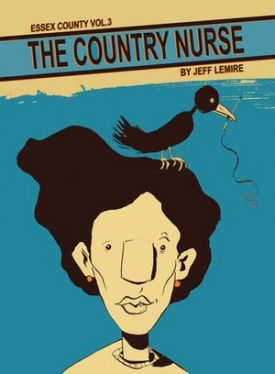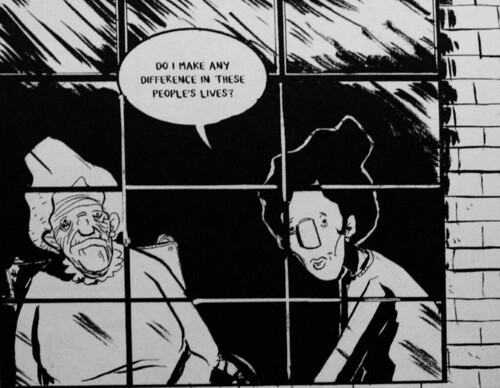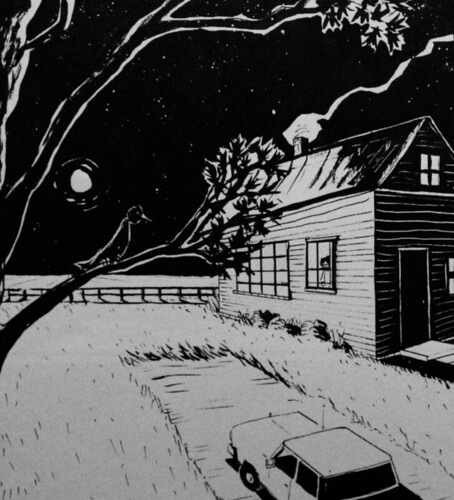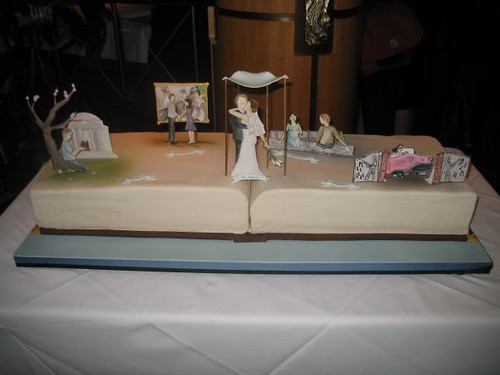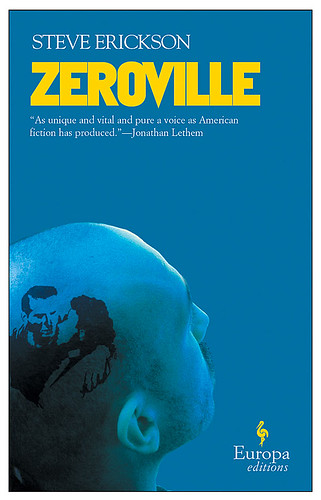I spent tonight prepping for NaNoWriMo, which starts just over 24 hours from now. Unfortunately, I have to write things by hand first. I don't know why, but it helps me in getting into the right mode. I spent probably more time than I should have picking out a notebook to use, but I wanted to go with something unique. I chose a notebook a friend of mine decorated and gave to me several years ago. I've been saving it for a special project, and this seems as good as any.
After work tonight I stopped off by my mom's house, where most of my books are still living. I picked up a few titles that might help me along the way. Samuel R. Delany's About Writing I plan on reading cover to cover while the writing prompts in Oulipo Conpendium, Lance Olsen's Rebel Yell and Jack Heffron's Idea Book I hope to use at those moments when I get stuck. I also grabbed some short story collections: the Complete works of Poe, Stranger Things Happen by Kelly Link and McSweeney's Mammoth Treasury of Thrilling Tales. Fun stuff, really, to give me mental breaks and help keep me going.
I've got my idea, vague though it may be. I've got my characters, as thin and translucent as they are. I don't know if this story will work or not, or if I even have it in me to write 5+ pages a day for 30 days straight. But I want to find out. I have to know if I can still tap into that undefinable something you hit when writing just starts to flow.
More once the writing commences.
Excelsior.
Thursday, October 30, 2008
Monday, October 27, 2008
Review: The Country Nurse by Jeff Lemire
I loved, loved, loved the first volume of Jeff Lemire's Essex County, a little graphic novel called Tales From the Farm that I reviewed last year. The second volume Ghost Stories delved into the family history and turned a sports story---something I don't always like---into a pretty powerful book about a rift between two brothers. The third and final volume in the trilogy shifts the focus a bit to Anne Quenneville, a traveling nurse who cares for many in the rural community of Essex County, Canada.
Anne primarily works as a device reintroducing us to the disparate members of the Lebeuf family. Lester, no longer donning his toy superhero cape, is a little more grown up but seems quite lonely while Jimmy continues to hide himself in his job at the town filling station. Anne decides to help the family heal by urging Jimmy to step forward and finally get to know his young son Lester, giving more formal answers to questions of lineage and familial tragedy that were only hinted at in the earlier volumes.
Lemire’s mildly cartoony art is more cinematic than ever here, making full poetic use of the wintry Canadian landscapes to force readers to pause and really feel the emotions of the characters. Lemire even makes some bold experiments in page layouts that he hasn't attempted previously. Plot-wise the story includes a side-tale of flashbacks featuring Lawrence, a Lebeuf ancestor who grew up in a desolate orphanage managed by a nun and a gruff caretaker. Although these flashbacks don’t have a direct impact upon the modern-day Lebeufs the past events do bring a deeper layer of history to the family.
The first two volumes worked exceptionally well as standalone stories, but this volume is completely dependent on what occurred in the first two; anyone new to this story will miss a lot of the subtext. In fact it might even work best when published with the other two in a single-volume book. That said, anyone who enjoyed the rest of the trilogy will enjoy the closure this one brings, but anyone new to Lemire should pick up the earlier volumes first. The talent and power he's shown in this trilogy promises years of good work to come and I'm really excited to see what Lemire does with his upcoming project with Vertigo Books.
Excelsior
Anne primarily works as a device reintroducing us to the disparate members of the Lebeuf family. Lester, no longer donning his toy superhero cape, is a little more grown up but seems quite lonely while Jimmy continues to hide himself in his job at the town filling station. Anne decides to help the family heal by urging Jimmy to step forward and finally get to know his young son Lester, giving more formal answers to questions of lineage and familial tragedy that were only hinted at in the earlier volumes.
Lemire’s mildly cartoony art is more cinematic than ever here, making full poetic use of the wintry Canadian landscapes to force readers to pause and really feel the emotions of the characters. Lemire even makes some bold experiments in page layouts that he hasn't attempted previously. Plot-wise the story includes a side-tale of flashbacks featuring Lawrence, a Lebeuf ancestor who grew up in a desolate orphanage managed by a nun and a gruff caretaker. Although these flashbacks don’t have a direct impact upon the modern-day Lebeufs the past events do bring a deeper layer of history to the family.
The first two volumes worked exceptionally well as standalone stories, but this volume is completely dependent on what occurred in the first two; anyone new to this story will miss a lot of the subtext. In fact it might even work best when published with the other two in a single-volume book. That said, anyone who enjoyed the rest of the trilogy will enjoy the closure this one brings, but anyone new to Lemire should pick up the earlier volumes first. The talent and power he's shown in this trilogy promises years of good work to come and I'm really excited to see what Lemire does with his upcoming project with Vertigo Books.
Excelsior
Thursday, October 23, 2008
Back to Real Life
Miss L and I made through both the wedding and honeymoon in good shape. I won't go into all the details, but things really went without a hitch. Perfect weather for an outdoor wedding, no one got so wasted they had to go to the hospital and no fist fights. What more can you ask?
Things were a little tense---at least for me---at the first part of the ceremony. I was standing up front with my family to my right, my groomsmen holding up the chupah and Miss L's family escorting her down the aisle. Right as the Rabbi was about to speak a group of motorcycles buzzed us, blasting the thundering noise of their engines as they throttled by. It was perfect. After a brief moment of silence everyone laughed and then we went forward with everything without a worry in world.
One of the special things about our wedding was our cake. Based on a series of drawings Miss L did, the cake was created by Charm City Cakes of Baltimore. Working with them was a great process. We came in with the vague idea of a cake with a pop-up book theme and they really ran with it. It came out well, and really speaks to our goofy yet bookish taste. It also tastes pretty good, too.
The only other real literary-related thing didn't come about until our honeymoon. We went up to the Brandywine River Valley in Pennsylvania, a real pretty place to go in the early fall. Along with trips to historic battlefields, old mansions, gardens and museums---yes, we're both big museum nerds---we also had a good time just poking around the stores in Kennett Square.
Probably my favorite shop was Thomas Macaluso Used & Rare Books, a wonderful two-floor store just off the town's main drag. Aside from some wonderful antique maps that Miss L kept ogling, the shop has some real gems like a first edition of WS Burroughs's Nova Express, an early US paperback edition of Joyce's Ulysses and a gorgeous book written and illustrated by the artist Rockwell Kent.
The owner was fantastic. Although I've been in stores with that quality of books before, normally the owners work really hard to make you as uncomfortable as possible if they don't think you're really there to buy something. He chatted with us, told us a bit of the history of the area, and even talked to us about literature. Although we didn't buy anything, he's someone I will probably seek out if I ever want to find a rare or unique book.
But now life moves forward and I have much to ponder. Where to look for a full time job, whether or not to do NanoWriMo this year, what to have for dinner tonight....so many things to consider. But mostly I'm looking forward to finding out what kind of lives Miss L and I will lead now that we've officially joined forces. Until next time...
Excelsior
Things were a little tense---at least for me---at the first part of the ceremony. I was standing up front with my family to my right, my groomsmen holding up the chupah and Miss L's family escorting her down the aisle. Right as the Rabbi was about to speak a group of motorcycles buzzed us, blasting the thundering noise of their engines as they throttled by. It was perfect. After a brief moment of silence everyone laughed and then we went forward with everything without a worry in world.
One of the special things about our wedding was our cake. Based on a series of drawings Miss L did, the cake was created by Charm City Cakes of Baltimore. Working with them was a great process. We came in with the vague idea of a cake with a pop-up book theme and they really ran with it. It came out well, and really speaks to our goofy yet bookish taste. It also tastes pretty good, too.
The only other real literary-related thing didn't come about until our honeymoon. We went up to the Brandywine River Valley in Pennsylvania, a real pretty place to go in the early fall. Along with trips to historic battlefields, old mansions, gardens and museums---yes, we're both big museum nerds---we also had a good time just poking around the stores in Kennett Square.
Probably my favorite shop was Thomas Macaluso Used & Rare Books, a wonderful two-floor store just off the town's main drag. Aside from some wonderful antique maps that Miss L kept ogling, the shop has some real gems like a first edition of WS Burroughs's Nova Express, an early US paperback edition of Joyce's Ulysses and a gorgeous book written and illustrated by the artist Rockwell Kent.
The owner was fantastic. Although I've been in stores with that quality of books before, normally the owners work really hard to make you as uncomfortable as possible if they don't think you're really there to buy something. He chatted with us, told us a bit of the history of the area, and even talked to us about literature. Although we didn't buy anything, he's someone I will probably seek out if I ever want to find a rare or unique book.
But now life moves forward and I have much to ponder. Where to look for a full time job, whether or not to do NanoWriMo this year, what to have for dinner tonight....so many things to consider. But mostly I'm looking forward to finding out what kind of lives Miss L and I will lead now that we've officially joined forces. Until next time...
Excelsior
Sunday, October 12, 2008
Marriage
By 7:00 pm tonight, assuming an asteroid doesn't strike the city of Baltimore and I don't get swallowed up by a roving dinosaur, will be married to Miss L. I'll share some photos and thoughts once we recover.
Saturday, October 04, 2008
Review: Zeroville by Steve Erickson
It seems the older I get the rarer it is that I'm really grabbed by a book. Oh, sure, I find books I admire, books I like, even books I love. But one that grabs me, that sticks with me when I'm driving, walking, working, even sleeping....those are rare books indeed. Steve Erickson gifted me with one with his novel Zeroville.
Although the concepts in the book are kind of a Pynchon meets Delillo ingested and spewed out via a transliterated chat with Luis Bunuel, the plot is actually pretty straightforward. It's the late 60's and a man named Vikar is booted out of the Architecture program at Mather Divinity College----he made the confounding error of designing a church without a door for his final project. Vikar responds to this letdown by following the lure of his other love---film--by getting a picture of Elizabeth Taylor and Montgomery Clift in From Here to Eternity tattooed on the side of his shaved head and hopping a bus to Hollywood.
The early sections of the book transform into a guided tour of Hollywood through the eyes of a man who has ingested nearly every bit of film trivia possible. Vikar moves into the Roosevelt hotel---which may or may not be haunted by D.W. Griffith--- and can't help but tell everyone around him everything he knows about the history of film. His architecture background serves him well when he's hired as a set designer at a studio. He gradually works his way up to the role of film editor meeting an odd cast of characters as he learns, lives and breathes the world of film.
His career takes some odd turns. Sent to Spain on one job, Vikar's kidnapped by a revolutionary faction that wants to use his talents to create propaganda films to help their cause. Later, he becomes the first film editor to win an award from the Cannes Festival all because no one really understands what he's trying to do. When the late 70's hits like a tire iron across the face Vikar develops a near-violent obsession with punk rock.
Vikar will likely drive some readers batty. He's knocked around by circumstances, rarely making choices or decisions of his own except at a couple of key moments. He's also inexplicably odd. A more traditional author would spend time getting us more firmly into his life and history so we can understand or even feel his mental state. Despite its readability this book is anything but traditional. Erickson more often than not uses Vikar not so much as a character but as an easel to lean his satire, jokes and theories on.
Erickson's writing is highly referential. Classic films and actors fill every section, but he also tosses out bits about cult films, art films, the lives of studio execs and industry business. But the references often blur the lines between real film history and fabrication. One character who continually pops up throughout the novel is a mildly revolutionary script writer/director we know only as Viking. But through various clues dropped throughout the book----that he co-wrote Apocalypse Now and worked on the Conan movies---you can figure out that Viking is probably based pretty solidly on John Milius. Soledad, a sexy actress who never quite makes it, seems to answer the question of what would have happened to Soledad Miranda if she hadn't died at such a young age. Other characters like Dotty Langer, who seems more real than anyone in this hyper-real book, seem to be completely born out of Erickson's imagination.
Criticism and meta-art also play a large role. Several characters---Vikar included---launch into page-long diatribes on the role of film that are both funny and fascinating. Vikar, for example, believes a film and its true meaning exist beyond the constraints of sequential time and we only structure movies that way to make the meaning more easily interpreted. Erickson slyly uses this idea for structuring his own novel by referencing moments that occur at the end of the book as early as page 50.
All of this, of course, is wonderfully funny---and fun---if you have a love of film and film history. For readers who don't it can become a bit like watching a Simpson's episode where you just don't know any of the cultural references. You think the jokes might be funny or even profound, but you really aren't sure because you have no real idea what the jokes are about.
Excelsior
Although the concepts in the book are kind of a Pynchon meets Delillo ingested and spewed out via a transliterated chat with Luis Bunuel, the plot is actually pretty straightforward. It's the late 60's and a man named Vikar is booted out of the Architecture program at Mather Divinity College----he made the confounding error of designing a church without a door for his final project. Vikar responds to this letdown by following the lure of his other love---film--by getting a picture of Elizabeth Taylor and Montgomery Clift in From Here to Eternity tattooed on the side of his shaved head and hopping a bus to Hollywood.
The early sections of the book transform into a guided tour of Hollywood through the eyes of a man who has ingested nearly every bit of film trivia possible. Vikar moves into the Roosevelt hotel---which may or may not be haunted by D.W. Griffith--- and can't help but tell everyone around him everything he knows about the history of film. His architecture background serves him well when he's hired as a set designer at a studio. He gradually works his way up to the role of film editor meeting an odd cast of characters as he learns, lives and breathes the world of film.
His career takes some odd turns. Sent to Spain on one job, Vikar's kidnapped by a revolutionary faction that wants to use his talents to create propaganda films to help their cause. Later, he becomes the first film editor to win an award from the Cannes Festival all because no one really understands what he's trying to do. When the late 70's hits like a tire iron across the face Vikar develops a near-violent obsession with punk rock.
Vikar will likely drive some readers batty. He's knocked around by circumstances, rarely making choices or decisions of his own except at a couple of key moments. He's also inexplicably odd. A more traditional author would spend time getting us more firmly into his life and history so we can understand or even feel his mental state. Despite its readability this book is anything but traditional. Erickson more often than not uses Vikar not so much as a character but as an easel to lean his satire, jokes and theories on.
Erickson's writing is highly referential. Classic films and actors fill every section, but he also tosses out bits about cult films, art films, the lives of studio execs and industry business. But the references often blur the lines between real film history and fabrication. One character who continually pops up throughout the novel is a mildly revolutionary script writer/director we know only as Viking. But through various clues dropped throughout the book----that he co-wrote Apocalypse Now and worked on the Conan movies---you can figure out that Viking is probably based pretty solidly on John Milius. Soledad, a sexy actress who never quite makes it, seems to answer the question of what would have happened to Soledad Miranda if she hadn't died at such a young age. Other characters like Dotty Langer, who seems more real than anyone in this hyper-real book, seem to be completely born out of Erickson's imagination.
Criticism and meta-art also play a large role. Several characters---Vikar included---launch into page-long diatribes on the role of film that are both funny and fascinating. Vikar, for example, believes a film and its true meaning exist beyond the constraints of sequential time and we only structure movies that way to make the meaning more easily interpreted. Erickson slyly uses this idea for structuring his own novel by referencing moments that occur at the end of the book as early as page 50.
All of this, of course, is wonderfully funny---and fun---if you have a love of film and film history. For readers who don't it can become a bit like watching a Simpson's episode where you just don't know any of the cultural references. You think the jokes might be funny or even profound, but you really aren't sure because you have no real idea what the jokes are about.
Excelsior
Subscribe to:
Posts (Atom)
